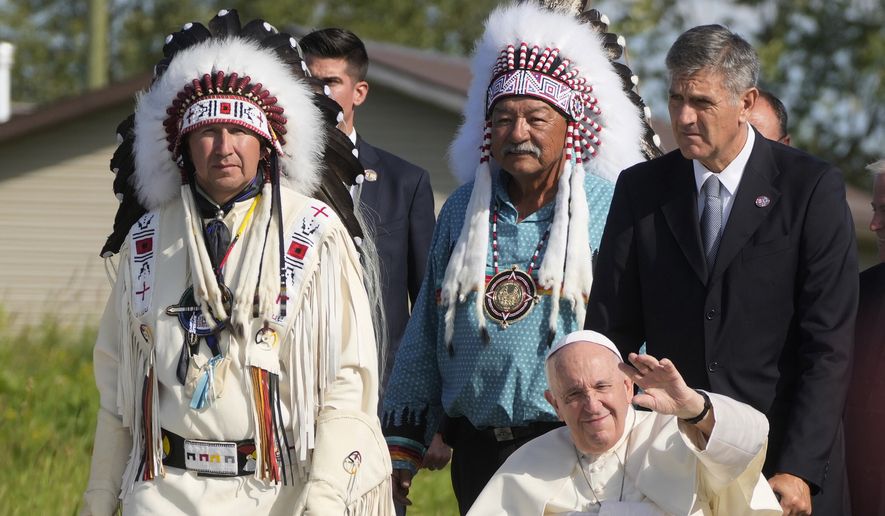VATICAN CITY (AP) — The Vatican on Thursday responded to Indigenous demands and formally repudiated the “Doctrine of Discovery,” the theories backed by 15th-century “papal bulls” that legitimized the colonial-era seizure of Native lands and form the basis of some property law today.
A Vatican statement said the papal bulls, or decrees, “did not adequately reflect the equal dignity and rights of Indigenous peoples” and have never been considered expressions of the Catholic faith.
The statement, from the Vatican’s development and education offices, marked a historic recognition of the Vatican’s own complicity in colonial-era abuses committed by European kingdoms, and Indigenous leaders welcomed it. It continued to take some distance from any actual Vatican culpability, however, saying the papal documents had been “manipulated” for political purposes by colonial powers “to justify immoral acts against Indigenous peoples that were carried out, at times, without opposition from ecclesial authorities.”
It said it was right to “recognize these errors,” acknowledge the terrible effects of colonial-era assimilation policies on Indigenous peoples and ask for their forgiveness.
The statement was a response to decades of Indigenous demands for the Vatican to formally rescind the papal bulls that provided the Portuguese and Spanish kingdoms the religious backing to expand their territories in Africa and the Americas for the sake of spreading Christianity.
Those decrees underpin the “Doctrine of Discovery,” a legal concept coined in a 1823 U.S. Supreme Court decision that has come to be understood as meaning that ownership and sovereignty over land passed to Europeans because they “discovered” it.
It was cited as recently as a 2005 Supreme Court decision involving the Oneida Indian Nation written by the late Justice Ruth Bader Ginsburg.
During Pope Francis’ 2022 visit to Canada, where he apologized to Indigenous peoples for the residential school system that forcibly removed Native children from their homes, he was met with demands for a formal repudiation of the papal bulls.
Two Indigenous women unfurled a banner at the altar of the National Shrine of Sainte-Anne-de-Beaupré on July 29 that read: “Rescind the Doctrine” in bright red and black letters. The protesters were escorted away and the Mass proceeded without incident, though the women later marched the banner out of the basilica and draped it on the railing.
In the statement, the Vatican said: “In no uncertain terms, the church’s magisterium upholds the respect due to every human being. The Catholic Church therefore repudiates those concepts that fail to recognize the inherent human rights of Indigenous peoples, including what has become known as the legal and political ‘doctrine of discovery.’”
Phil Fontaine, a former national chief of the Assembly of First Nations in Canada who was part of delegation that met with Francis at the Vatican before the trip and then accompanied him throughout, said the statement was “wonderful,” resolved an outstanding issue and now puts the matter to civil authorities to revise property laws that cite the doctrine.
“The Holy Father promised that upon his return to Rome they would begin work on a statement which was designed to allay the fears and concerns of many survivors and others concerned about the relationship between their Catholic Church and our people, and he did as he said he would do,” Fontaine told The Associated Press.
“The church has done one thing, as it said it would do, for the Holy Father. Now the ball is in the court of governments, the United States and in Canada, but particularly in the United States where the doctrine is embedded in the law,” he said.
The Vatican offered no evidence that the three papal bulls (Dum Diversas in 1452, Romanus Pontifex in 1455 and Inter Caetera in 1493) had themselves been formally abrogated, rescinded or rejected, as Vatican officials have often said. But it cited a subsequent bull, Sublimis Deus in 1537, that reaffirmed that Indigenous peoples shouldn’t be deprived of their liberty or the possession of their property, and were not to be enslaved.
Cardinal Michael Czerny, the Canadian Jesuit whose office co-authored the statement, stressed that the original bulls had long ago been abrogated and that the use of the term “doctrine” — which in this case is a legal term, not a religious one — had led to centuries of confusion about the church’s role.
The original bulls, he said, “are being treated as if they were teaching, magisterial or doctrinal documents, and they are an ad hoc political move. And I think to solemnly repudiate an ad hoc political move is to generate more confusion than clarity.”
He stressed that the statement wasn’t just about setting the historical record straight, but “to discover, identify, analyze and try to overcome what we can only call the enduring effects of colonialism today.”
It was significant that the repudiation of the “Doctrine of Discovery” came during the pontificate of history’s first Latin American pope. Even before the Canadian trip, the Argentine pope had apologized to Native peoples in Bolivia in 2015 for the crimes of the colonial-era conquest of the Americas. It was issued while he was in the hospital Thursday with a respiratory infection.
Cardinal José Tolentino de Mendonça, prefect of the Vatican’s culture office, said the statement was a reflection of the Vatican’s dialogue with Indigenous peoples.
“This Note is part of what we might call the architecture of reconciliation and also the product of the art of reconciliation, the process whereby people commit to listening to each other, to speaking to each other and to growth in mutual understanding,” he said in a statement.
___
Rob Gillies contributed from Toronto.




Please read our comment policy before commenting.